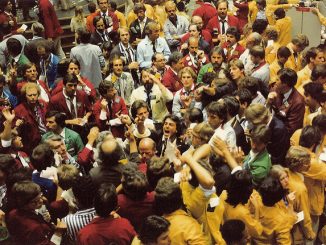I have not been a fan of this rally, and I have been selling into it. I do have a rule for equity clients — cash never goes above 20%. I have been close to that recently, and after rebalancing some companies that have hit the top of the weighting band, I have bought those companies with the lowest weights in the portfolio. I have also added some stable companies in the recent past — Berkshire Hathaway, Ingram Micro, Validus Holdings, AFLAC, and CST Brands.
My next quarterly reshaping comes up next week, and again, I will be looking at neglected industries in the market for areas to purchase. When the momentum runs this hard, I have to be content to trail (though I haven’t been trailing). I have to ask where things will be three or more years from now, rather than ponder the next quarter. The answer to that is more murky than I would want, because of abnormal economic policy. It makes us all more skittish, and obscures price signals.
I have suggested in the past that a good solution in the face of uncertainty is to do half of what you would like to do. Doing half breaks the psychological stranglehold of fear and greed, because regardless of what happens, part of your decision was a success.
You could also start to make a “shopping list.” Start looking for names that you would like to buy 10, 20, 30% lower, and set alerts. Who knows how rapidly things will move when the correction or bear market comes.
You could keep a close eye on the 200-day moving average for the S&P 500, waiting for the index to cross under that as a sell signal, but if you want to be ahead of the crowd, maybe you want to use the 190-day moving average :)
I tend to use industry selection and other factors, like balance sheet strength and reliability of cash flows as my main risk reduction tools rather than outright reduction of equities owned. In general, I have been a good picker of stocks over the last 13 years, and I want to continue using that advantage.
With bonds, I am playing it safe with short and intermediate corporates, and taking reasoned chances with emerging markets debt. Beyond that, I am thinking of buying long Treasuries as a deflation hedge.
The equity market is well above where long-term valuation measures like the Q-ratio, and CAPE10 would value it. Most of that is due to low interest rates and high levels of QE. How certain are you that both will persist, and for how long? Personally, I think both will persist for some time, but not forever. Profits attract competitors, and low rates discourage savers.
Though we don’t know when change is coming, we have to be ready for change. Whatever you do for defense, make preparations now to be defensive; this era and valuation levels will not persist.
Aside from that, remember that when a system is so artificially supported, it relies on peace & continued support from governments. Either could vary. Peace is not certain, and neither is the current set of economic policies. Be ready, because there can be all manner of surprises.
Full disclosure: long BRK/B, IM, VR, AFL, CST
- Bulenox: Get 45% to 91% OFF ... Use Discount Code: UNO
- Risk Our Money Not Yours | Get 50% to 90% OFF ... Use Discount Code: MMBVBKSM
Disclaimer: This page contains affiliate links. If you choose to make a purchase after clicking a link, we may receive a commission at no additional cost to you. Thank you for your support!




Leave a Reply